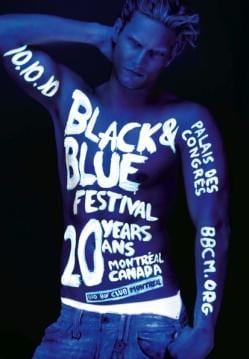The hot summer of 1990 saw the infamous police raid on the Sex Garage loft party in Old Montreal, which turned out to be Montreal’s Stonewall. The raid on the underground party led directly to the creation of the two gay festivals that put Montreal on the international gay map — Black & Blue in 1991 and Divers/Cité in 1993.
“Montreal definitely needed a breath of fresh air back in 1991, especially in [Montreal’s] gay nightclub scene, which was a bit lame at the time,” Black & Blue head honcho Robert Vezina tells Xtra. “We made sure we had the approval of the police to do such a gay after-hours, with all the permits, etc. in order to avoid the problems encountered at Sex Garage. After the first two B&B events in 1991 and 1992, we knew we had a successful formula and decided to do it on an annual basis. I knew we were going to have a good run — but not 20 years!”
After drawing just 800 revellers to their first party in 1991 — raising $3,500 for AIDS Community Care Montreal — B&B has become the single most successful all-night dance party on the planet. Over two decades, Vezina says, B&B has generated more than $300 million in local economic spin-offs, plus donated $1.5 million to various AIDS and gay/lesbian organizations.
One of the key reasons for B&B’s longevity is it no longer is just a gay party, says Vezina.
“It’s a big celebration for everyone,” Vezina says. “The gay core is still very present, especially in the middle of the dancefloor. [But] young ravers and many gay-friendly beautiful people attend.”
“The B&B dancefloor is one of the rare places where nobody cares what your sexual orientation is — except when you want to pick someone up!” says the Caroline Rousse, Vezina’s right-hand (wo)man since 1995. “This is the really special aspect of the Montreal crowd: gays and straights mingle together and there is no homophobia. We also encourage gay tourists — surprised to see many straights at our party — not to discriminate against heterosexuals. Now they realize everyone is accepted and equal at our event.”
Pre-9/11 attendance peaked in 1999 when 17,000 partygoers packed B&B’s Olympic Stadium outfield dancefloor. Over the years, all-star DJs have included Danny Tenaglia, Victor Calderone, Roger Sanchez, Peter Rauhofer, as well as Montreal’s own Misstress Barbara and Mark Anthony — Vezina’s fave DJ over the years — who has spun at 14 B&Bs, including the very first party.
“This is partying on a grandiose scale!” says Mark Anthony. “The moment that stands out most occurred during B&B 1999 at noon, the end of the party, at the end of my set. After the last song I looked down to the dancefloor from the DJ booth, which was two storeys up! A sea of bodies still stood there clapping and cheering for more music! When the lights came on I was blown away to see about 15,000 people [still] assembled. It was a very magical and surreal moment.”
Performers over the years include pop and dance legends like The Human League, Jimmy Somerville, Martha Wash, Ultra Naté, Loleatta Holloway and Montreal’s own Queen of Soul, Michelle Sweeney, who once descended from the Olympic Stadium roof like an angel to join the Chorale Ganymède choir in singing “Reach Out” by Sounds of Blackness.
“I had to walk along this narrow [catwalk] high above the stage,” Sweeney recalls. “Now, I’m not a small woman and here I was — oh my God — looking down at all those people dancing below!”
“That was back in 1996, the same year Girlina flew over the crowd in a spaceship and landed on the stage!” Rousse remembers. “That was my favourite B&B edition! There are things we did back then that just can’t be done anymore, like [Michelle Sweeney] on that stage coming down from the ceiling. Oh boy, that would not be accepted by the authorities now!”
And the worst moment in 20 years?
“When the Hells Angels showed up in a huge gang to break into the event in 1996!” Vezina sighs. “We had to close the doors for quite a long time — nobody could come in or out — until the police got them to leave.”
How about the biggest diva bitch to work with?
“Kevin Aviance,” Vezina says without missing a beat.
Despite all the global tourism accolades, the tens of thousands of tourists jetting to Montreal over the years and millions of tax dollars pouring into government coffers, today B&B has been virtually cut off by the feds in Ottawa.
“The Harper government, through Economic Development Canada, has cut our funding since 2006,” Vezina says. “We have also been declined [by] the special fund for festivals [run] by Heritage Canada. They basically told us [not] to reapply every year. I think the Harper government is the worst Canada has ever had. They are backward, against the environment, against gays, against open culture, against women’s rights. We will apply again for funding when they are kicked out of office.”
An all-star 25th anniversary B&B concert now appears to be in the works (B&B tried to sign Madonna for its 10th anniversary party), and plans are already underway for next year’s 21st edition.
“It will be called Black Jack,” Vezina says. “But the whole team, including myself, we’re still taking this all one year at a time!”
Black & Blue Festival wraps up Oct 12. See bbcm.org for details.
Moise’s Apples is Richard Burnett’s monthly xtra.ca column on the history of gay Montreal. Burnett is also editor-at-large of Montreal’s Hour magazine, where he writes his national queer-issues column, Three Dollar Bill.


 Why you can trust Xtra
Why you can trust Xtra


